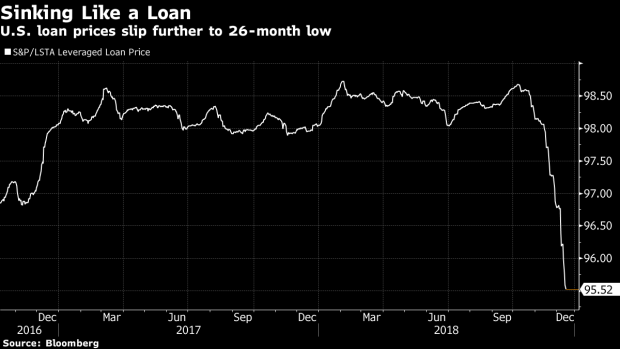Dec 14, 2018
Japanese Banks Fueled the U.S. Leveraged-Loan Boom, UBS Says
, Bloomberg News

(Bloomberg) -- Japanese banks might have snapped up a third of the loans made to highly indebted U.S. companies, propelling the size of the market past $1 trillion, a new estimate from UBS Group AG suggests.
Years of low yields spurred investors to pour money into leveraged loans -- credit extended to companies with the weakest balance sheets. Such assets were pitched as a haven for those worried about the prospect of rising interest rates, and were often repackaged into so-called collateralized loan obligations, or CLOs, with credit enhancements to protect investors.
Now the worry is that cracks are beginning to develop in what was once one of the hottest products on Wall Street. A record $2.53 billion was yanked out of leveraged-loan funds in the week ending Dec. 12, while Wells Fargo & Co. and Barclays Plc recently took the rare step of pulling a $415 million deal from the market. Just 0.9 percent of U.S. loans tracked by Citigroup Inc. trade above par, or face value, compared with more than 70 percent just a few months ago.
Japanese banks have been buying the top-rated AAA pieces of CLOs because they have higher yields than like-rated sovereign debt, according to UBS, with the lenders making up about 33 percent of inflows into the asset class in the past several years. While the demand is vulnerable to a pullback, it should help provide stability to the market in the face of a recent sell-off, the bank said.
“The Japanese bid for U.S. loans will not be easily broken,” analysts led by Stephen Caprio wrote in research published this week. “Most Japanese banks are buy-and-hold investors; outright selling will be fairly limited unless the prospect of outright credit losses becomes likely, necessitating much higher recession risk than today.”
It’s one example of a broader trend of Japanese investors looking for returns overseas, faced with zero yields at home. Many of the CLOs were bought through so-called repacks, in which dollar-denominated assets are essentially repackaged into Japanese yen using a special purpose vehicle and a currency-swap agreement with another bank.
Japanese banks may be buying between half and three-quarters of AAA rated CLO tranches, UBS said, citing evidence from clients and analysis of the market for cross currency basis swaps. Without the Japanese bid for AAA rated CLO paper, top-rated CLO spreads would likely widen back to at least 2014 levels, or 50 basis points wider, the bank estimated.
Ballooning Size
The size of the leveraged loan market has ballooned to $1.1 trillion from $682 billion in 2014, according to UBS. That’s not far from the $1.2 trillion worth of junk-rated corporate bonds outstanding, a market that has also exploded in size thanks to years of low interest rates and yield-hungry investors.
“Leveraged loans have supplanted junk bonds as the home for more risky credit,” the UBS analysts wrote, calculating that by one measure -- debt extended to companies rated just a few notches above default -- there’s now more risky loans outstanding, at $794 billion, than risky bond debt at $750 billion.
Analysts are sounding varying degrees of alarm on the asset class, with JPMorgan Chase & Co. noting that CLO issuance has proved more resilient than other types of credit in the face of market volatility. Despite a decline in secondary market prices, sales of U.S. CLOs have reached a record $127 billion year-to-date, JPM said.
That supply dynamic could work against the market, though, as investors grow wary about an economic slowdown alongside central bank policy normalization.
Citigroup’s Call
“Recent outflows represent a small fraction of the inflows that occurred over the prior two years," Michael Anderson and Philip Dobrinov at Citigroup wrote in a Dec. 13 note. “We expect further weakness ahead.”
Even Japanese banks may slow their buying in cases such as a rise in hedging costs to extremes or a jump in stresses on European lenders involved in the repacks that gets so severe it undermines those structures -- with counterparty default being the worst-case scenario, UBS said.
Japanese banks should in theory continue to anchor the market as long as government yields stay low and the Bank of Japan clings to its ultra-easy monetary policies, UBS said. But ownership from other types of funds could “amplify downside,” especially if investors start to worry about defaults in the face of any looming recession, the analysts wrote.
To contact the reporters on this story: Cecile Gutscher in London at cgutscher@bloomberg.net;Tracy Alloway in Hong Kong at talloway@bloomberg.net
To contact the editors responsible for this story: Samuel Potter at spotter33@bloomberg.net, Christopher Anstey, Yakob Peterseil
©2018 Bloomberg L.P.